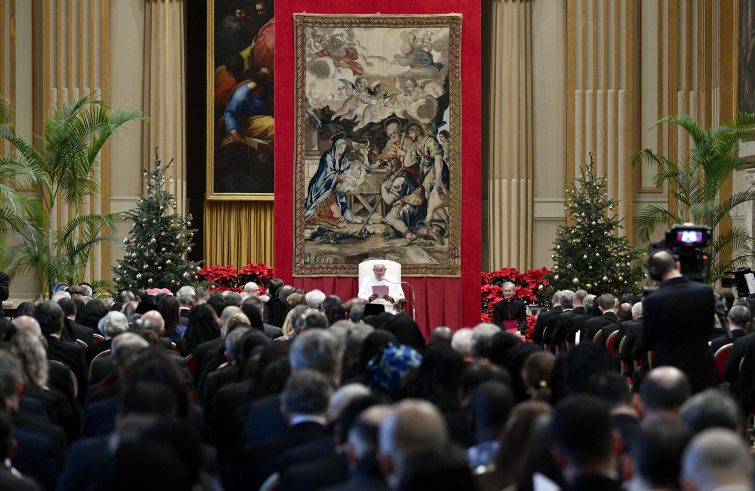
“Our world is witnessing a growing number of conflicts that are slowly turning what I have often called a third world war fought piecemeal into a genuine global conflict,” is the snapshot shared by Pope Francis in his traditional New Year’s address to the Diplomatic Corps, delivered in the Benediction Hall and devoted to peace, “at the beginning of a year that we hope to be one of peace, but has instead dawned amid conflicts and divisions.” A total of 184 states currently maintain full diplomatic relations with the Holy See, in addition to the European Union and the Sovereign Military Order of Malta.
“I cannot fail to reiterate my deep concern regarding the events taking place in taking place in Palestine and Israel”,
the Pope’s first appeal: “All of us remain shocked by the October 7 attack on the Israeli people. I renew To all the parties involved I renew my appeal for
a cease-fire on every front, including Lebanon,
and the immediate liberation of all the hostages held in Gaza. I ask that the Palestinian people receive humanitarian aid, and that hospitals, schools and places of worship receive all necessary protection. It is my hope that the international community will pursue with determination the solution of two states, one Israeli and one Palestinian, as well as an internationally guaranteed special status for the City of Jerusalem, so that Israelis and Palestinians may finally live in peace and security.” “Sadly, after nearly two years of large-scale war waged by the Russian Federation against Ukraine, the greatly desired peace has not yet managed to take root in minds and hearts, despite the great numbers of victims and the massive destruction”, the Pope denounced with regard to other hot spots of the war front: “One cannot allow the persistence of a conflict that continues to metastasize, to the detriment of millions of persons; it is necessary to put an end to the present tragedy through negotiations, in respect for international law”, is the Pope’s appeal.
“Civilian victims are not ‘collateral damage’”,
Francis said with regard to the situation in Ukraine and Gaza: “even when it comes to exercising the right to self-defence, it is essential to maintain a proportional use of force.”
“Wars are able to continue thanks to the enormous stock of available weapons”, the Pope said, calling to “pursue a policy of disarmament.” He reiterated the “immorality of manufacturing and stockpiling of nuclear weapons” and renewed the proposal to set up a global fund to eradicate hunger and foster global sustainable development. “The climate crisis” demands an increasingly urgent response and full involvement on the part of all”, Francis said. He pointed out that COP28 final declaration “is an encouraging step”, with the hope that it will lead to “a decisive acceleration of the ecological transition.”
in the last ten years the Mediterranean “has turned into a great cemetery”, the Pope denounced with regard to one of the consequences of the conflicts. “Let us not forget – Francis remarked – that the great number of victims include many unaccompanied minors.”
The Mediterranean should instead be “a laboratory of peace.” “This does not detract from the fact that migration should be regulated, in order to accept, promote, accompany and integrate migrants, while at the same time respecting the culture, sensitivities and security of the peoples that accept responsibility for such acceptance and integration”, the Pope pointed out, who asked to “create the conditions” for the effective exercise of the right to remain in one’s homeland. “In confronting this challenge, no country should be left alone, nor can any country think of addressing the issue in isolation, through more restrictive and repressive legislation adopted at times under pressure of fear or in pursuit of electoral consensus”, the Pope said, welcoming “the commitment of the European Union to seek a common solution through the adoption of the new Pact on Migration and Asylum, while at the same time noting some of its limitations, especially concerning the recognition of the right to asylum and the danger of arbitrary detention.”
Moreover, the path to peace “calls for respect for life, for every human life, starting with the life of the unborn child in the mother’s womb, which cannot be suppressed or turned into an object of trafficking.”
In particular, Francis deems “deplorable the practice of so-called surrogate motherhood”, calling on the international community “to prohibit this practice universally.” Likewise, he deems “gender theory” to be “extremely dangerous”, since “it cancels differences in its claim to make everyone equal.” At international level, Francis highlighted “the weakening of structures of multilateral diplomacy”, which splitting into ‘clubs’ that only admit states deemed ideologically compatible”, and “even agencies which have thus far proved effective, risk paralysis due to ideological polarization and exploitation by individual states.” The year 2024 will witness elections being held in many nations, the Pope noted. “It is important, then, that citizens, especially young people, consider it one of their primary duties to contribute to the advancement of the common good through a free and informed participation in elections.” Furthermore, peace is threatened by the persecution and discrimination against Christians – more than 360 million Christians around the world– and by the rise in acts of anti-Semitism, a “scourge” that “must be eliminated from society. Finally, peace can be undermined by “fake news” or by the misuse of artificial intelligence, which, just like any other technological development, “remains at the service of the human person, “whose place can never be taken by an algorithm or a machine.” “Today, perhaps more than ever, we need a Holy Year”, Francis said in the concluding remarks referring to the Jubilee due to begin next Christmas. “For everyone – Christians and non-Christians – the Jubilee can be a time when swords are beaten into ploughshares, a time when one nation will no longer lift up sword against another, nor learn war any more.”












